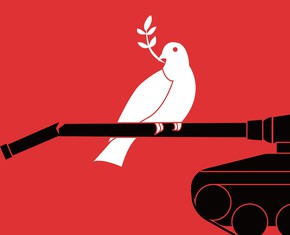The views expressed in our content reflect individual perspectives and do not represent the authoritative views of the Baha'i Faith.
God has not accredited any difference between the male and the female. – Abdu’l-Baha, Star of the West, Volume 2, p. 8.
Lately, colleges and universities have begun offering “How to Avoid Sexual Assault” classes to female students. Which made me wonder: shouldn’t they also offer “How to Stop Sexually Assaulting Women” classes to male college students? Rather than focus solely on the victim, shouldn’t we pay attention to the perpetrator?
Lately, we’ve all become familiar with the terms “hyper-masculinity” or “toxic masculinity.” The existence of those terms proves that our cultures have now begun to grapple with what it means to be a man, and have even initiated the process of re-defining masculinity itself.
In the past, we tended to raise our boys with two very different definitions of masculinity. When I grew up, boys were trained to become men by their fathers, their peers and their cultures, and we got one message from all those sources early and often: if you want to be a “real” man, don’t show your feelings; don’t be a weakling; hit back, only harder; win at all costs; get mad and get even; dominate others, especially women; grab as much money and power as you possibly can, even if it means stepping on people to get there.
In the universal male process of developing a masculine identity, boys soon learn the huge differences between being a “good man” and being a “real man.” Good men evince integrity, personal honor and responsibility; but real men use violence and aggression to get their way. Good men faithfully support their families; real men aggressively and crassly objectify women. Good men have empathy and impulse control; real men win at all costs. Good men never kiss and tell; real men boast about their exploits and their conquests. Good men never cheat; real men never lose. Good men have spiritual values that guide their life choices; real men take advantage of the moment with situational ethics. Good men are reliable, steady and boring; real men—the “bad boys”—are exciting and dynamic and fun and interesting. Confusing, isn’t it?
As boys, when we explored the vast difference between being good men and real men by experimentally and temporarily trying on the “real man” values, we usually got in trouble for it. During the discovery and punishment phase of that trouble, we always heard one common phrase: “Well, boys will be boys.” Male misbehavior and acting out was often excused with that one phrase. We never once heard the opposite excuse: “Well, girls will be girls.” After all, the adult reasoning went, we were males, expected to do stupid things, break stuff, use foul language, take unnecessary risks, hurt others, treat females poorly, damage property, commit petty crimes, employ violence as a problem-solving method, create chaos and generally make a mess of our lives and the lives of others.
With those expectations, it’s a wonder any of us boys lived through our childhoods and adolescence. Of course, many boys did grow up to be men with those “real man” ideas, and those narrow, selfish and egotistical outlooks generated extreme anguish and pain for the females they encountered. In two extensive studies of sexual assault, for example, the hyper-masculinity of “real men” was found to contribute heavily to a tendency towards sexual aggression and violence:
When men are taught to be dominant and aggressive, this often leads to hyper-masculinity, male peer support for sexual aggression, development of rape myths, and adversarial sexual beliefs. – Kilmartin, 2000; Rozee & Koss, 2001.
Today, luckily and happily, things are changing. Boys—once expected to be violent, aggressive, hyperactive, competitive, stoic, uncontrollable and wildly impulsive—have now begun to learn cooperation, non-violent conflict resolution, impulse control and empathy for others. With that kind of early instruction, boys can finally express their inner feelings without losing their sense of self. Teaching those essentially spiritual values reduces the volatility and violence of past boyhood expectations, which means that dismissing bad behavior by invoking the old “boys will be boys” excuse has declined in the process. Now, when you hear that kind of reasoning, it has begun to sound hollow and hypocritical.
The Baha’i teachings point all of this out when they advise parents and teachers to educate both sexes equally and on the same terms:
The first duty of the beloved of God and the maid-servants of the Merciful is this: They must strive by all possible means to educate both sexes, male and female; girls like boys; there is no difference whatsoever between them. The ignorance of both is blameworthy, and negligence in both cases is reprovable. – Abdu’l-Baha, Baha’i World Faith, p. 398.
This approach to the early training and education of children emphasizes the child’s mind, heart and spirit rather than the child’s gender. Instead of training boys and girls differently, instead of inculcating a different set of sex-specific moral values, instead of asking males and females to assume rigid and pre-determined roles, this approach allows each child to find his or her own identity, and to base that identity on the development of good character and noble intentions rather than gender.
After all, we’re all human, regardless of our sex:
The teachings of Baha’u’llah also proclaim equality between man and woman, for He has declared that all are the servants of God and endowed with capacity for the attainment of virtues and bestowals. All are the manifestations of the mercy of the Lord. In the creation of God no distinction obtains. All are His servants. In the estimation of God there is no gender. The one whose deeds are more worthy, whose sayings are better, whose accomplishments are more useful is nearest and dearest in the estimation of God, be that one male or female. – Abdu’l-Baha, The Promulgation of Universal Peace, p. 374.
You May Also Like
Comments

















the quality lists for "good" and
"real" men. There is plenty of chance for identity crises there!
It reminded me of "Nice guys finish
last" and of Green Bay Packers coach
Vince Lombardi's supposed view that
nothing mattered but victory. In
finding that he was somewhat misread, I saw an interesting article
at www.theguardian.com, "Winning
isn't the main thing; it's the only
thing. Right?". It shows that the cooperative urge isn't completely
missing even in sports. The Baha'i
scriptures have long tried ...to convince
us combativeness isn't an inherent
trait, and getting along well with others is really more natural!
In the future, I'd recommend you make substantive comments and criticism, rather than relying on ad hominem arguments. Saying that writers have "complexes and shortcomings" only reveals a lack of ability or desire to address the actual substantive content of an issue. Also, please tell those you've recommended the site to that we focus on the wider global society and its problems and issues, not just on "Baha'i society," because Baha'u'llah ...asked us to be "anxiously concerned with the needs of the age ye live in." - David Langness, Managing Editor
the quality lists for "good" and "real" men! There is plenty of
chance for crazy-making there!
It reminded me of "Nice guys
finish last", and of Green Bay Packers coach Vince Lombardi's
supposed view that nothing mattered but victory. In finding
that he was somewhat misread, I
saw an interesting article at www.
theguardian.com, "Winning isn't the
main thing; it's the only thing. Right?".
It reminds us the cooperative urge
isn't completely missing even in
sports. The Baha'i scriptures have ...
long tried to convince us that human
combativeness isn't a genetic trait,
and getting along well with others
is a real human desire, though sometimes overshadowed by circumstances.